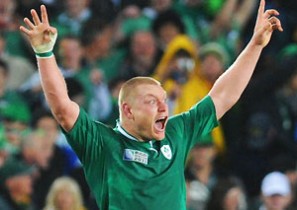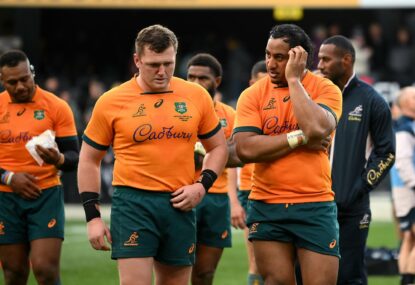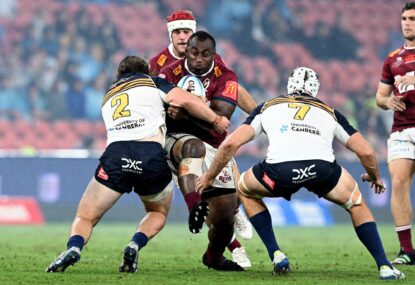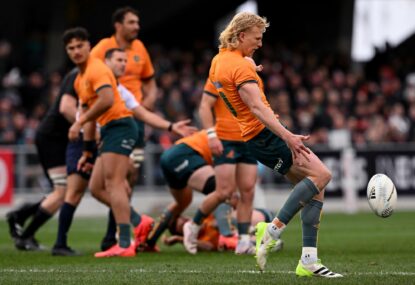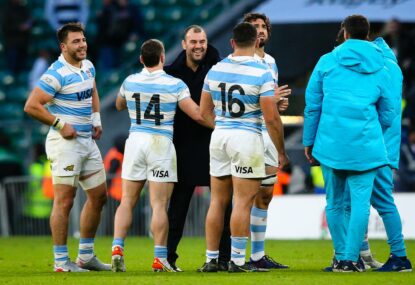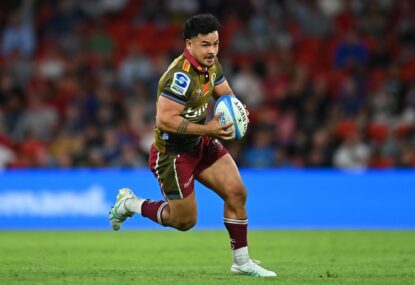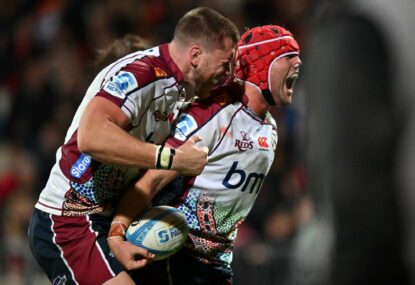Much is made about the magic of the FA Cup. It’s a romantic’s dream when a lowly third division team from Chelmsford can beat the odds and end up shocking the mighty Manchester United.
This doesn’t happen in rugby for two reasons.
First, such is the IRB way, countries such as Senegal (now 41st in the world) can never shock the rugby world and beat a nation ranked in the top 10.
They don’t get to play them. In fact, Australia have only ever played against 20 different countries in their history, meaning that a team as highly ranked (16th) as Georgia has never played the Wallabies.
If the IRB really wants to develop that game, as should be the case, then the boost that some of these countries outside the top 10 would get from a game against a (severely) weakened Wallaby team would be huge.
But that’s a thought for another day.
Second, the gap between the “elite” teams in rugby is very minimal.
In every premier competition in the world, there a huge number of legitimate contenders each year. In Super Rugby, every team outside of the Rebels, Lions and Force will feel that they have a strong chance to make the playoffs next year.
Match ups between the Sharks and the Brumbies, or the Highlanders and the Waratahs can go either way, with no one thinking that the end result, whatever it may be, is an upset.
The same is true in international rugby.
While acknowledging that victories over New Zealand and South Africa would be upsets, any team can beat anyone from third to seventh.
Each one of Wales, England, Ireland, Australia and France will feel that they are good enough to be named third best in the world, and that they are the best chance of beating South Africa and maybe upsetting New Zealand.
Which brings us to this weekend’s game. Ireland v Australia.
Ireland are ranked sixth in the world, to Australia’s fourth.
Recent history between the teams is close, with two wins to each side in the last five games and a draw.
Australia haven’t beaten Ireland in Dublin since 2005, with Gordon D’Arcy, Rory Best, Tommy Bowe and Tatafu Polotau-Nau the only survivors with a chance of playing at the weekend.
The most recent game, a 15-6 win to Ireland in the Rugby World Cup 2011 counted as an upset, but would a victory for Ireland this weekend also be a shock?
I would argue it wouldn’t. Australia’s record in Dublin isn’t great, and their form, while improving, isn’t good enough.
When the game was tight against England two weeks ago, they got rattled; and their confidence appears paper thin.
Ewen McKenzie has brought a bit of spark back into the Wallabies with 18 tries in their last four games, although if you take out the two seven try drubbings, they’ve only scored 13 tries in their 10 other games in 2013.
Australia are in a vulnerable place right now.
Ireland’s record in 2013 isn’t great either, with a dismal Six Nations all the way back in February/ March ending Declan Kidney’s reign.
A lot of time has passed since then, and the leaders among the Irish squad were in Australia, where Sean O’Brien, Paul O’Connell, Jonny Sexton, Conor Murray, Tommy Bowe, Brian O’Driscoll and Jamie Heaslip all played a part in a victorious Lions Test series.
Peter O’Mahony, Fergus McFadden, Ian Madigan, Paddy Jackson, Mike Ross, Devin Toner and Mike McCarthy played parts in Ireland’s tour of the US and Canada.
Joe Schmidt has brought a freshness to the squad, and there as an air of calmness as they went about their business against Samoa, with no hang-ups on form, or worries about the pressures to win.
If the papers are to be believed, Ireland will target the Wallaby lineout and scrum, and the battle of the breakdown will be fierce.
For years Ireland haven’t had a “genuine openside” and have instead used the breakdown talents of Cian Healy, Rory Best, Paul O’Connell, Jamie Heaslip and Brian O’Driscoll. Michael Hooper will have a lot on his plate.
Australian media expects Ireland to use the “choke” tackle that served them well in 2011 to go after the Wallabies in the scrum time and again.
While this will no doubt be a tactic, I suspect that they will use another alternative style of tackling to get as many offloads as possible.
Ireland have been trying the chop tackle technique against Samoa; so much so that attentive listeners to the referees microphone on Saturday could hear shouts encouraging them to tackle low so the next man in could get over the ball quickly.
This helped to win 12 turnovers in open play and a few other penalties for holding on.
There will be a few players making their first appearance against Australia. Munster captain Peter O’Mahony and Fergus McFadden are likely candidates, while Paul O’Connell’s second row partner, be it Devin Toner or Mike McCarthy would also be new to Australian audiences.
Luke Marshall is pushing Gordon D’Arcy hard for a spot in the 12 jersey, while Jack McGrath will build on his man of the match performance from the bench.
McFadden and McCarthy are workmanlike players.
Their work ethic is their main asset.
McFadden runs good lines, and is a solid versatile player.
Devin Toner is a 6’10” giant who is finally showing some promise with a higher work rate and more physicality.
McGrath is a dynamic loosehead, and at 24 has many years ahead of him. Has the potential to be involved in Lions squads in the future, his work at the breakdown on Saturday was very good, and he got the better of Mulipola in the scrum.
Peter O’Mahony is a leader. In the Paul O’Connell mould of leading by example O’Mahony terrorised Samoa at the breakdown last Saturday. He is a strong carrier and willing tackler.
Always rises to the occasion, he is fired up by almost anything, if he controls his aggression he could be as effective as Stephen Ferris was in 2011.
Luke Marshall, if he plays, is in my opinion, the complete second five eighth.
Similar to Kyle Godwin, Marshall was raised as a fly half, which shows in his kicking, playmaking and distribution skills, he’s a big physical back with pace that causes chaos in attack and hammers people when he’s defending.
Three concussions in quick succession at the end of last year raised a lot of concerns but he seems to be fine now. He is one who has a big future.
The weather is set for cloudy with a good chance for rain, which sets up an intriguing Test match.
While Ireland wouldn’t lose too much confidence with a loss, a win wouldn’t be greeted with the same shock as 2011. Bring on the Aussies.





























































































